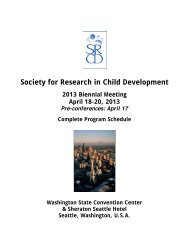Josef Perner - Society for Research in Child Development
Josef Perner - Society for Research in Child Development
Josef Perner - Society for Research in Child Development
Create successful ePaper yourself
Turn your PDF publications into a flip-book with our unique Google optimized e-Paper software.
<strong>Perner</strong>: Yes. Now people talk--now that we know what the bra<strong>in</strong> does <strong>in</strong> parts that they say, they're<br />
more adventurous and say, okay, but that need be all done <strong>in</strong> that place. And we can look at how<br />
different processes <strong>in</strong>teract and so on. So I th<strong>in</strong>k people tend to go away from modularity.<br />
Apperly: So how would you like to see the field develop <strong>in</strong> the next few years? Where do you th<strong>in</strong>k<br />
it should go?<br />
<strong>Perner</strong>: Yes. Now that people become aware aga<strong>in</strong> of proper cognitive analysis of what goes <strong>in</strong> a task<br />
and what the mental representations have to be <strong>for</strong> do<strong>in</strong>g it and see how those mental representations<br />
are done <strong>in</strong> the bra<strong>in</strong>.<br />
Apperly: Right.<br />
<strong>Perner</strong>: But of course, that's difficult with the current methods.<br />
Apperly: But your feel<strong>in</strong>g is that the neuroscientific approach really gets its <strong>in</strong>terest to you from its<br />
ability to <strong>in</strong>tegrate with a good cognitive analysis?<br />
<strong>Perner</strong>: Yes. Right. Yes. And the little bra<strong>in</strong> imag<strong>in</strong>g I am do<strong>in</strong>g, I use it basically as I use the children's<br />
age.<br />
Apperly: Okay.<br />
<strong>Perner</strong>: Because the <strong>in</strong>terest <strong>in</strong> children is to ga<strong>in</strong> <strong>in</strong><strong>for</strong>mation about how our m<strong>in</strong>d is structured by<br />
say<strong>in</strong>g, "Okay. If it's structured that way, then children-- certa<strong>in</strong> tasks should be mastered at the same<br />
age, right?" And here you have a much richer field to play with, not just the age at which someth<strong>in</strong>g is<br />
done but the bra<strong>in</strong> region by which various tasks are done.<br />
Apperly: Okay. So I th<strong>in</strong>k on the last question then, it's just some personal notes really. So if you<br />
could tell us someth<strong>in</strong>g about your personal <strong>in</strong>terests and your family, I guess, particularly <strong>in</strong> a way<br />
that they've had a bear<strong>in</strong>g on your career.<br />
<strong>Perner</strong>: Yes. Well, I have been married <strong>for</strong> almost 30 years, one year miss<strong>in</strong>g, I th<strong>in</strong>k.<br />
Apperly: Not <strong>in</strong> the middle?<br />
<strong>Perner</strong>: No. Next year. And we have two children who are now <strong>in</strong> their twenties. And, of course, as a<br />
good developmental psychologist I tried to sort of observe my children a bit. But I found that extremely<br />
difficult and also found out that I couldn't get a decent replication of Piaget's procedures and realized<br />
that Piaget could only do that at the scale he did because he had a nanny who took care of the basic<br />
needs of the children.<br />
Apperly: So you found it difficult on the practical level--<br />
<strong>Perner</strong>: Practical level, right.<br />
Apperly: --rather than--.<br />
<strong>Perner</strong>: Because I was a responsible caretaker.<br />
Apperly: Yes. Yes. Yes.<br />
<strong>Perner</strong>: And also had to cope with the children's emotional needs.<br />
Apperly: Sure. Sure.<br />
<strong>Perner</strong>, <strong>Josef</strong> - Interview.docx 18
















